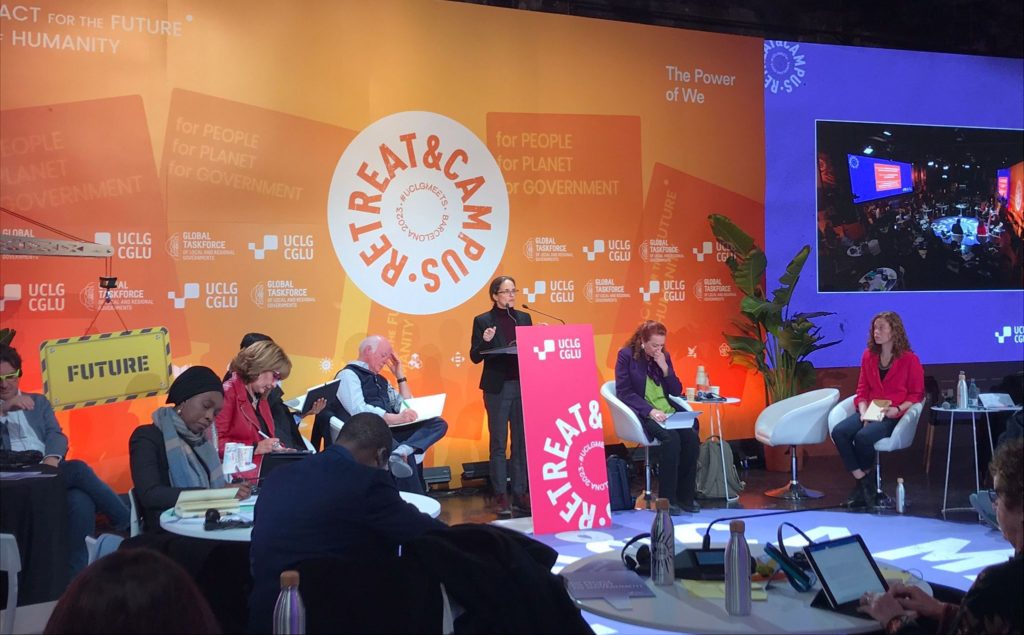
The Global Platform for the Right to the City (GPR2C) participated in the UCLG Annual Retreat (February, 2023), a week-long gathering that provides an opportunity for the key notes of the organization and partners to define synergies and develop actions in line with the work plans set out by the governing bodies.
Lorena Zárate, GPR2C coordinator, gave the following introductory pitch about the Commons, one of the four enablers of the Pact for the Future (the others are: Commons, Finance, Trust and Governance Architecture) during the Future Envisioning Workshop:
Thank you Pablo and thank you UCLG for the invitation. We’re honored and happy to have the opportunity to be part of this process and this dialogue today.
We know it and we see it: the environmental crisis, the growing inequality crisis and the political crisis (or the crisis of trust and representation) are all connected. There is no way to tackle one without tackling the others, because they affect life as a whole. Of course, this multifaceted crisis is at the same time deeply local and inescapably global.
The COVID 19 pandemic has made clear that the commons are at the core of them all. There will be no sustainability, there will be no human rightsorsocial justice, there will be no right to the city or democracy without the commons. Therefore, we need to recover, to protect, and to foster the commons if we’re are going to have any chance to address the challenges we’re facing today.
Air, water, land, forests, food, housing, health and education… basic services and public spaces, collective knowledge and culture… In other terms, material and symbolic things that are necessary for the reproduction of society. All crucial goods and resources that are being privatized, dismantled, destroyed… Basically taken away from the majority for the exponential profits of the minority.
We hear it everywhere: we need a new social contract based on a different paradigm. A paradigm of care, solidarity, redistribution. A social contract that includes the whole of society, starting with those traditionally marginalized, excluded and left behind. Because many women,youth, black and Indigenous Peoples are not just asking to be included:they are claiming a radical changein the rules of the game. Even more so, they are actually being that change by showing the alternatives pathways ahead.
So, as discussed yesterday, we pretty much know the why and the what. The question is the how (who, where, when; with whom, with which resources…). Then the commons and commoning are part of the answer too: because they are not just things but social relations, transformative social relations that can bring about the changes we need. As such, they can be the critical foundations of the new socio-territorial contracts.
In fact, many cities and local communities are already doing so. Places where the public and the community sectors collaborate to provide basic services and manage collective facilities. Public-community partnerships show that there is another way to work together and to care for our places and at the same time for the planet. As we all know, local and regional governments are best placed to understand both the urgency and the possibilities to act in coordination with multiple actors, deepening transparency and democracy.
Of course, it’s not easy. There is and there will be opposition, inertia and resistance from the status quo. There are and there will be tensions and unexpected consequences. And critical limitations too, including manufactured polarization and the growing powers of the transnational corporations, but also our social and institutional skills to manage the commons. We urgently need to re-learn those skills. And the only way to do so is through practicing and experimenting.
The world urgently needs a map of possible dreams. A cartography of the impossible made possible. Cities and local communities are already drawing this map and we are convinced that the UCLG network has the power to accelerate and foster transformation like no other global-local (glocal) actor.
*More information about the UCLG 2023 Annual Retreat is available in the Municipal Times




